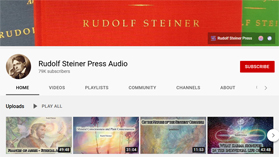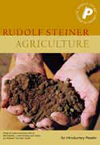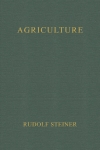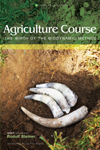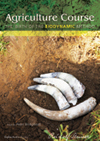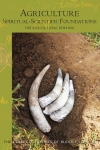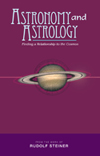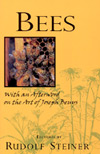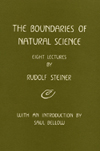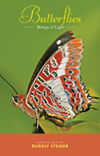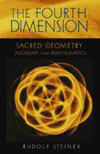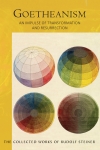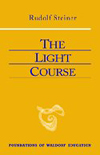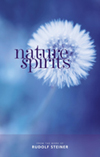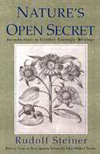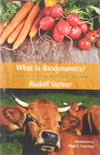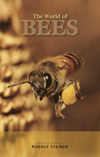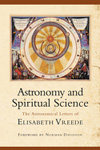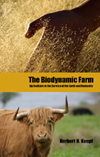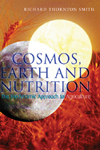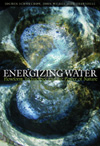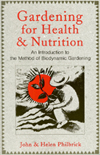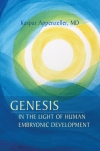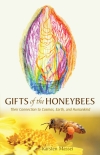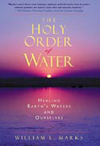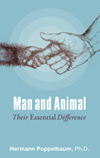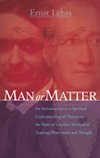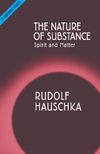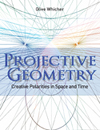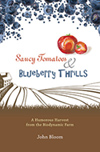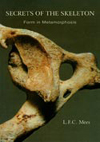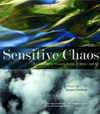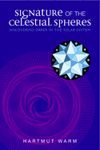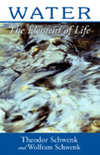
- RUDOLF STEINER
- OTHER AUTHORS
-
SCIENCE AND NATURERUDOLF STEINER
An Introductory Reader
Compiled with an introduction, commentary and notes by Richard Thornton Smith
Rudolf Steiner, the often undervalued, multifaceted genius of modern times, contributed much to the regeneration of culture. In addition to his philosophical teachings, he provided ideas for the development of many practical activities, including education - both general and special - agriculture, medicine, economics, architecture, science, religion and the arts. Today there are thousands of schools, clinics, farms, and many other organizations that are founded directly on his principles.
AGRICULTURE - SPIRITUAL FOUNDATIONS FOR THE RENEWAL OF AGRICULTURE
8 lectures and 4 discussions, Koberwitz, June 7–20, 1924
The Birth of the Biodynamic Method
When Rudolf Steiner gave these lectures 80 years ago, industrial farming was on the rise and organic methods were being replaced in the name of science, efficiency and technology. With the widespread alarm over the quality of food in recent years, and the growth of the organic movement and its mainstream acceptance, perceptions are changing. The qualitative aspect of food is once again on the agenda, and in this context Rudolf Steiner's only course of lectures on agriculture is critical to the current debate.
The Birth of the Biodynamic Method
Audio Book, complete and unabridged version (10 CD set) read by Peter Bridgmont
When Rudolf Steiner gave these lectures 80 years ago, industrial farming was on the rise and organic methods were being replaced in the name of science, efficiency and technology. With the widespread alarm over the quality of food in recent years, and the growth of the organic movement and its mainstream acceptance, perceptions are changing. The qualitative aspect of food is once again on the agenda, and in this context Rudolf Steiner's only course of lectures on agriculture is critical to the current debate.
AGRICULTURE, SPIRITUAL-SCIENTIFIC FOUNDATIONS
for Agricultural Renewal
One hundred years after Rudolf Steiner presented his lectures on agriculture in 1924, the impact of his words are self-evident. Around the world, biodynamic principles are practised in thousands of thriving farms, vineyards and gardens, and Demeter certification for biodynamic produce is recognized internationally as a mark of quality.
Finding a Relationship to the Cosmos
compiled by M. Jonas
In the Middle Ages, Astronomia - one of the Seven Liberal Arts - was as much about astrology as astronomy. In fact the two disciplines only parted company in the seventeenth century, as the materialistic world-view gained greater prominence. Where once human destiny was connected to stars and planets, and spiritual or soul qualities were associated with the natural world, now the cosmos was seen as consisting of gases, fire and dead rock.
With an Afterword on the Art of Joseph Beuys
In response to a question from an audience of construction workers, Rudolf Steiner began this series of lectures on bees. 'One only begins to understand the life of the bees when one knows that the bee lives in an atmosphere completely pervaded by love,' Steiner says. The unconscious wisdom contained in the beehive, and how this relates to the human experience of health, civilization, and the cosmos, is amply described in this unique book.
THE BOUNDARIES OF NATURAL SCIENCE
Paperback
“We must begin by acquiring the discipline that modern science can teach us. We must school ourselves in this way and then, taking the strict methodology, the scientific discipline we have learned from modern natural science, transcend it, so that we use the same exacting approach to rise into higher regions, thereby extending this methodology to the investigation of entirely different realms as well.” —Rudolf Steiner
Beings of Light
"The butterfly flutters above and over the earth, borne on the air and shimmering with light... We ought really to see them as nothing other than beings of light, joyous in their colours and the play of colours. All the rest is garment and luggage." - Rudolf Steiner
Sacred Geometry, Alchemy and Mathematics
The point, line, plane and solid objects represent the first three dimensions, but a kind of reversal of space is involved in the ascent to a fourth dimension. Steiner leads us to the brink of this new perspective - as nearly as it can be done with words, diagrams, analogies and examples of many kinds. In doing so, he continues his lifelong project of demonstrating that our objective, everyday thinking is the lowest rung of a ladder that reaches up to literally infinite heights.
An Impulse of Transformation and Resurrection
‘There will be a resurrection – a resurrection that should not be imagined politically… but it will be a resurrection. Goetheanism still rests in the grave as far as external culture is concerned. But Goetheanism must rise again.’
'Foundations of Waldorf Education' series
Rudolf Steiner's course on light, which includes explorations of color, sound, mass, electricity and magnetism, presages the dawn of a new world view in the natural sciences that will stand our notion of the physical world on its head.
Selected Lectures
Based on knowledge attained through his highly-trained clairvoyance, Rudolf Steiner contends that folk traditions regarding nature spirits are based on spiritual reality. He describes how people possessed a natural spiritual vision in ancient times, enabling them to commune with nature spirits. These entities - which are also referred to as elemental beings - became immortalised as fairies and gnomes in myth, legend and children's stories.
Introductions to Goethe's Scientific Writings
It was as an interpreter of Johann Wolfgang von Goethe that Rudolf Steiner first became known. In 1882, at the age of 21, he was asked to be the editor of Goethe's scientific writings for a new edition of his works. By thoroughly penetrating, assimilating and appropriating Goethe's way of thinking and perceiving, Steiner schooled himself for his own epistemological, scientific and mystical-esoteric work.
A Way to Heal and Revitalize the Earth
Introduction by Hugh Courtney
In 1924 - in response to questions about the depletion of soils and a general deterioration of crops and livestock - Rudolf Steiner gave eight lectures on "the spiritual foundations for a renewal of agriculture." Based on his suggestions and spiritual science, generations of farmers, gardeners, viticulturist, and researchers developed biodynamics as a healing, nurturing, holistic, ecological, organic, and spiritual approach to a sustainable care of the Earth.
‘The whole hive is really pervaded by the life of love. The individual bees relinquish love but develop it instead throughout the hive. And so we start to understand bee existence if we recognize that the bee lives in an air, an atmosphere, that is entirely impregnated with love.’
-
SCIENCE AND NATUREOTHER AUTHORS
ASTRONOMY AND SPIRITUAL SCIENCE
(previously published as Anthroposophy and Astrology)
The Astronomical Letters of Elizabeth Vreede
Elizabeth Vreede
Astronomy and Spiritual Science collects writings on astronomy by Dr. Elizabeth Vreede and is a fascinating compendium of scientific and spiritual knowledge. Between September 1927 and August 1930, Dr. Vreede wrote a monthly “letter”, available by subscription, about both modern astronomy and classical astrology in the light of spiritual science. These letters include clear explanations of the fundamentals of astronomy and discussions of the role of astrology in the modern world. They also include inspiring presentations of a worldview that sees the stars, planets, and in fact all physical phenomena as manifestations of spiritual beings and spiritual activities.
Agriculture in Service of the Earth and Humanity
Herbert Koepf
Bankrupt farmers, erosion of topsoil, and poor food quality owing to pesticides, hormones, and other additives - these are the well-known realities of the modern crisis in farming. This problem is the outcome of the limited vision of conventional methods and a system that focuses exclusively on quick results and profits. The need for change is clear, and Koepf provides a vast array of research data and results, as well as many helpful details on animal feeding, crop rotation, diseases, pests, and fertilizing. He shows that the biodynamic method of farming and gardening is an alternative that can turn farming around.
Life on a Community Owned Farm
Impressions of Tablehurst and Plaw Hatch, Sussex, England
Tom Petherick, photography by Will Heap
'Biodynamics seeks the holistic and interrelated health of the diverse creatures and beings composing a farm, including human beings and the wider, surrounding community. It is not just a "method" but a whole approach to life - one which could have far-reaching benefits for the health of the soil, plants, animals and human beings across the globe...'
The Biodynamic Approach to Agriculture
Richard Thornton Smith
In recent years there has been an explosion of interest in organic and biodynamic produce. Although once marginal and 'alternative', escalating concerns about the environment, health, food quality and animal welfare have brought organics into mainstream consciousness.
Flowform Technology and the Power of Nature
Jochen Schwuchow
John Wilkes, Iain Trousdell
The poor quality of water, as well as its restricted supply and availability, is one of the biggest challenges of our time, with presently two-fifth's of the world's population unable to find adequate fresh water for essential usage.
GARDENING FOR HEALTH AND NUTRITION
An Introduction to the Method of Biodynamic Gardening
John Philbrick
Helen Philbrick
BACK IN PRINT
GENESIS IN THE LIGHT OF HUMAN EMBRYONIC DEVELOPMENT
Kaspar Appenzeller, MD
Dr. Kaspar Appenzeller compares the biblical story of creation to human embryonic development. He leads us through his years of research into the grand imagery in the book of Genesis, relating it to what today’s science has to say about the origin of the human body. He reaches the concrete view that the human being is a small cosmos, a microcosm in the vast cosmos, the macrocosm. The original Hebrew language proves to be a true marvel—not only the meaning but also the individual sounds of the words illustrate the reality they describe. We are confronted with the fact that the writer of Genesis touched the true educational impulses of the world and humanity.
Their Connection to Cosmos, Earth, and Humankind
Karsten Massei
“When studying honeybees, one will find that they are creatures whose secrets are not easily elicited. A bee colony is an extremely complex entity. It consists of many thousands of individuals who have the ability to respond wisely to a wide variety of circumstances. To this day, it is not clear how they achieve this. In fact, one could say that a bee colony is imbued with an incomprehensible wisdom that encompasses each individual bee and ensures that the colony remains viable despite ever-changing living conditions.” — KarstenMassei
Healing the Earth's Waters and Ourselves
William Marks
Long gone are the days of drinking naturally pure water from flowing rivers and streams-or even your tap. It is common today for people to use bottled water or to filter home water for drinking and cooking. How did we arrive at such a predicament, and what can we do about it? Continuing pollution, ever increasing population and industrial demands, destruction of the rainforests, and overuse of the ground water are responsible for the deterioration of water quality, but the underlying problem, as Marks shows in his wide-ranging, thoughtful book, is a lack of understanding of and respect for the nature of water itself.
Their Essential Difference
Hermann Poppelbaum, Ph.D.
‘To be man is to know the animals and all the creatures of the earth; it is to recognize our responsibility towards these beings, once of the same order as ourselves, but now obliged to live beside us in an incompleteness that never ceases its appeal to human beings – warning us to make ourselves worthy of the trust invested in us.’ – Hermann Poppelbaum
An Introduction to a Spiritual Understanding of Nature on the Basis of Goethe’s Method of Training Observation and Thought
Ernst Lehrs
In this third, enlarged edition of Lehrs’ classic study, the reader is led, step by step, to a spiritual-scientific method of investigation. The author demonstrates how one can transcend the boundaries of the physical-material world, to the metaphysical origins of nature and the human being. This is a pioneering new method of training both the mind and eye, as well as other human senses, leading to a transformation from our modern ‘onlooking’ consciousness to a new kind of ‘participative’ consciousness.
Spirit and Matter
Rudolf Hauschka
What is the nature of matter? Within conventional science, the reductionist, materialist view asserts that matter is solely physical. Hauschka shows that open-minded study, based on qualitative observation and quantitative research, can overcome this now standardized view. Without denying the laws of matter, he shows the limitations of a science restricted by them, and points to new research which indicates the primal nature of spirit.
Creative Polarities in Space and Time
Olive Whicher
Olive Whicher's groundbreaking book presents an accessible - non-mathematician's - approach to projective geometry. Profusely illustrated, and written with fire and intuitive genius, this work will be of interest to anyone wishing to cultivate the power of inner visualization in a realm of structural beauty.
SAUCY TOMATOES AND BLUEBERRY THRILLS
A Humorous Harvest from the Biodynamic Farm
John Bloom
Is farming funny (punny)?
Biodynamic farming?Form in Metamorphosis
L. F. C. Mees, MD
In this seminal study of human bone forms, Dr Mees reveals the skeleton as an articulate work of art. But who is the artist? Using a blend of phenomenological observations and artistic intuition, the author carefully explores the anatomical facts of the human skeleton, with the beauty of many bones impressively described and illustrated through numerous parallel photographs and illustrations.
The Creation of Flowing Forms in Water and Air
Preface by Jacques Cousteau
Theodor Schwenk
"So movingly and well told is his tale that you will not want to put the book down until the end." - James Lovelock
SIGNATURE OF THE CELESTIAL SPHERES
Discovering Order in the Solar System
Hartmut Warm
"A milestone in modern research on the the harmony of the spheres." - Novalis magazine
SOUL DEVELOPMENT THROUGH HANDWRITING
The Waldorf Approach to the Vimala Alphabet
Jenifer Crebbin
Soul Development through Handwriting cultivates the noble qualities to which Waldorf education has long been devoted through the use of specific forms for shaping letters. The Vimala Alphabet was meticulously designed to support independent thinking, engaged willpower, balance, tolerance, honour, and intuition, as well as strengthening the developing soul forces of children.
The Element of Life
Theodor Schwenk
Wolfram Schwenk
It is the living movement of water that makes life on Earth possible. Based on spiritual science and on their own numerous experiments, Theodor and Wolfram Schwenk show that our Earth is a living organism, with water as a sensory organ that perceives vital cosmic influences and transmits them into earthly life. This pioneering classic on water is more relevant now than ever before.

